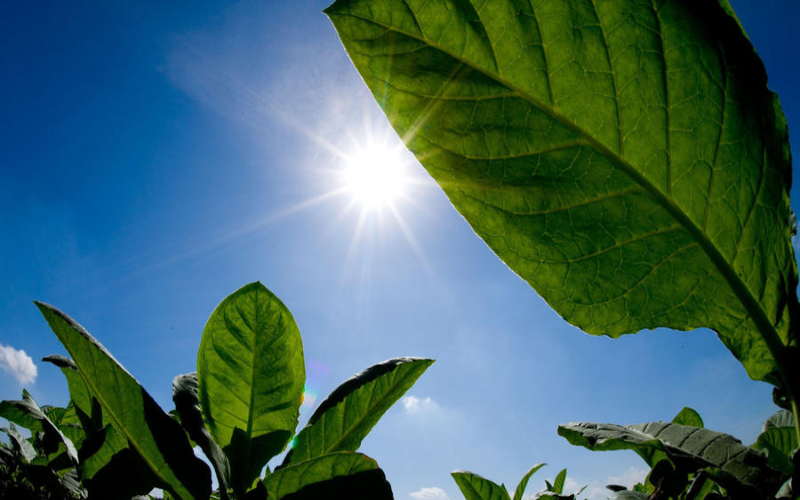11 Dec 2024

Tired Earth
By The Editorial Board

Ever since humans first walked the earth, we have relied on plants for our survival.
They provide us with food, shelter, medicine and even the oxygen we breathe. Now, a team of scientists is wondering if they can protect us from climate change as well.
Friday, researchers at the Salk Institute for Biological Studies in San Diego launched a new initiative to improve on the ability of plants to suck carbon dioxide out of the atmosphere and store it deep in the soil. They call it “Harnessing Plants.”
“There are a lot of geoengineering efforts to come up with ways of pulling carbon dioxide out of the air,” said Joseph Noel, a chemical biologist at Salk who is working on the project. “Plants do this anyway, so why not try a biological solution as well.”
During the growing season, plants pull more than 100 gigatons of carbon out of the atmosphere through the process of photosynthesis. But much of that carbon is eventually released back into the air as C02 — either because we and other animals eat the plants or burn them, or they return to the soil where bacteria and fungi cause them to decompose.
The effects of this yearly cycle are measurable on a global scale. The concentration of carbon dioxide in the atmosphere consistently drops during the Northern Hemisphere’s spring and summer, when plants are growing across the large land masses of North America, Europe and Asia. When winter descends and fewer plants are growing and others are decaying, the C02 concentrations rise once again.
One of the Salk team’s goals is to find a way to help plants do a better job of taking the carbon they absorb from the atmosphere and keeping it in the soil.
They already have a lead on how to make this happen.
All plants make a substance called suberin that protects their roots. You are likely familiar with suberin even if you don’t know it. It’s the same material as the cork in your wine bottle or on your corkboard. It’s also the material that makes up the skin of a potato.
The unique properties of suberin help plants in many ways, said Noel. It makes them more tolerant of drought and paradoxically, more tolerant of floods. Plants that grow in salt water produce a lot of suberin because it helps regulate how much salt is absorbed by their roots. It also serves as a protection against disease.
But perhaps most importantly for the group’s goals, suberin is a carbon-rich polymer that is very difficult for bacteria and fungi to break down.
Noel first observed this after throwing a cork from a wine bottle in with his compost at home.
“It’s a natural plant product, but when I put it in the compost heap, nothing happened to it even as everything else decayed,” he said.
Further research in the lab revealed that suberin is one of the most stable forms of carbon in the soil. That means once carbon from the atmosphere makes it into the ground in the form of suberin, it will stay put.
Armed with this information, one of the group’s first goals is to breed a variety of plants that can produce more suberin than they currently do today.
“We don't want to change photosynthesis, because plants are already so good at it,” said Joanne Chory, a plant biologist at Salk who is leading the initiative. “But we want them to make bigger roots and deeper roots with more suberin. We think we can get them to make 20 times what they make now pretty easily.”
Of course, for their suberin-rich plants to have an impact on the global carbon cycle, they will have to be deployed on an enormous scale. In the longer term, the group envisions partnering with governments around the world to distribute seeds to farmers.
“5% of the world’s crop land is what we want to change over,” Chory said.
It’s an enormous goal, and one that even Chory admits sounds a bit crazy. But she also believes that the group’s work is an essential step toward creating a more sustainable planet.
“I don’t think we have a choice but to work on this,” she said.
Scientists who are not involved in the initiative agreed.
“We have to take as much as 1 trillion tons of carbon dioxide out of the air and as of now, there are no viable and scalable ways of taking carbon out of the air,” said V. Ram Ramanathan, professor of climate sciences at Scripps Institution of Oceanography. “Soil restoration and locking the carbon in biomass is a major option and we have to do everything we can to develop the method and the technology. I am truly excited by this initiative from Salk.”
Michael Strano, a chemical engineer who works with plants at MIT, noted that there are several advantages of using plants to sequester carbon. The only energy they need to do their work is harvested from the sun, plus they can regenerate themselves and are capable of self-repair.
“We need to start thinking in the direction of carbon sequestration and I think plants are going to be a big part of that,” he said.
Already the Salk Institute has invested more than $7 million in the initiative, including building six high-tech climate control rooms that will allow the researchers to test seeds in a variety of climates, and future climates, from around the world.
Chory said the group will begin by using traditional breeding processes to develop seeds in the lab that produce more suberin. They hope to have them ready to test on grazing lands within five years.
“The only path to sustainability is going to involve plants,” she said.
Source : www.latimes.com
Comment